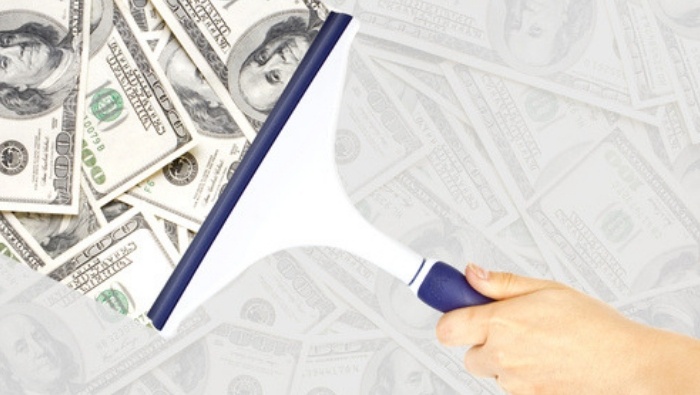A 10-Step Financial Spring Cleaning Plan

We’re so diligent about spring cleaning our homes and even our cars. Don’t our finances deserve an annual cleaning, too?
The birds are chirping, the grass is greening up, and it’s the time of year again for spring cleaning. Instead of reaching for the feather duster and the mop, why don’t you first spring clean your finances?
Follow this simple 10-step financial spring cleaning plan to mop up any potential money messes and get your financial house in order.
1. Think taxes, not waxes.
The tax deadline is approaching, so gather all your documents like W-2s and year-end tax statements.
Now is a great time to check on your deductions. Are you having too much taken out or not enough? If you have a child who turned 18, maybe you need to change your number of dependents.
2. Shine a light on your property taxes.
Take a look at the annual statement for property taxes. Make sure the amount reflects the current value of your home. It doesn’t hurt to check; this could help your mortgage payment go down if there is a discrepancy.
Sign Up for Savings
Subscribe to get money-saving content by email that can help you stretch your dollars further.
Twice each week, you'll receive articles and tips that can help you free up and keep more of your hard-earned money, even on the tightest of budgets.
We respect your privacy. Unsubscribe at any time.
3. Dust off your insurance policies.
At least once a year, go over all your insurance policies and look for deductions. Check around, and let your current agent know you are.
When I needed to add my teenaged daughter to our auto insurance, she initially quoted me a whopping $129 a month extra. After checking with all the major companies and getting lower quotes, I let her know, and mysteriously the price dropped down to $60 a month. “It must have been a computer glitch,” she said.
You can typically get extra discounts when you combine all your policies with one company. Also, if you added any safety features to your home, or any energy efficient products, you also qualify for extra savings.
Check for lower auto rates here.
4. Watch out for speed bumps in the budget.
Every year, an unexpected bill pops up. But are they really unexpected?
Perhaps you pay for your warehouse club or Amazon Prime membership annually. Every three months one of the cars needs an oil change. There is always a jump in the budget when planning a getaway. November rolls around and there’s lots of extra food to buy, a gift list to fill, and extra postage for mailing.
Sit down and make a list of these not-so-frequent bills, and this year you will be prepared.
5. Declutter your debt repayment plan.
If you have been making minimum payments only, you know you will be in debt for a long time. Make a concentrated effort to be debt free by adding extra to one bill until that is paid off. Then move the extra payment to the next bill in line, until you are living happily debt free. It’s also a good time to make sure you’re getting the lowest rate available.
6. Energize your emergency fund.
If you have been adding regularly to your savings, bump it up a bit, even if it’s just an extra $10 a month. Every little bit counts, and the money will be there when you need it.
Get the interest you deserve. You can compare savings rates here.
7. Scrutinize your savings for retirement.
Time to compare interest rates and check your fund’s performance. Make sure you are still getting the best return on your investment.
8. Scour your mortgage.
If you purchased a home this past year, you might have been stuck with a high mortgage rate. Keep an eye on rates this year. If they edge back down, consider refinancing. A 1% rate reduction could save you a few hundred dollars per month!
9. Don’t forget about your credit score.
Have you checked your credit score recently? A low score could be costing you money.
A good credit score can get you a better interest rate on your next loan, help you save on auto insurance and even improve your chances of renting an apartment or get a job.
These days it is easy to keep a close eye on your credit score. If you don’t have a credit card that provides you with free credit score monitoring, consider signing up for a free service such as Credit Sesame or Credit Karma.
10. Streamline your routine.
Make bill paying a breeze by automating your payments with online banking. Most banks still offer it for free. Just estimate how much the bill will be and make sure the money is in the account before the due date, which you can usually specify.
For bills that fluctuate like energy bills and water, add a cushion to avoid overdrafts.
It is easy to keep track of through your computer or phone, or checking with the company directly. No more lost checks in the mail or late payment fees.
An orderly financial house can bring you peace of mind and a brighter financial future. So be sure to give your finances an annual well-deserved spring cleaning.
Reviewed February 2024
About the Author
Shaunna Privratsky became an expert in personal finance out of necessity. Between writing, reading and gardening, she is always on the lookout for bargains. Visit her at The Discount Diva.
Sign Up for Savings
Subscribe to get money-saving content by email that can help you stretch your dollars further.
Twice each week, you'll receive articles and tips that can help you free up and keep more of your hard-earned money, even on the tightest of budgets.
We respect your privacy. Unsubscribe at any time.


